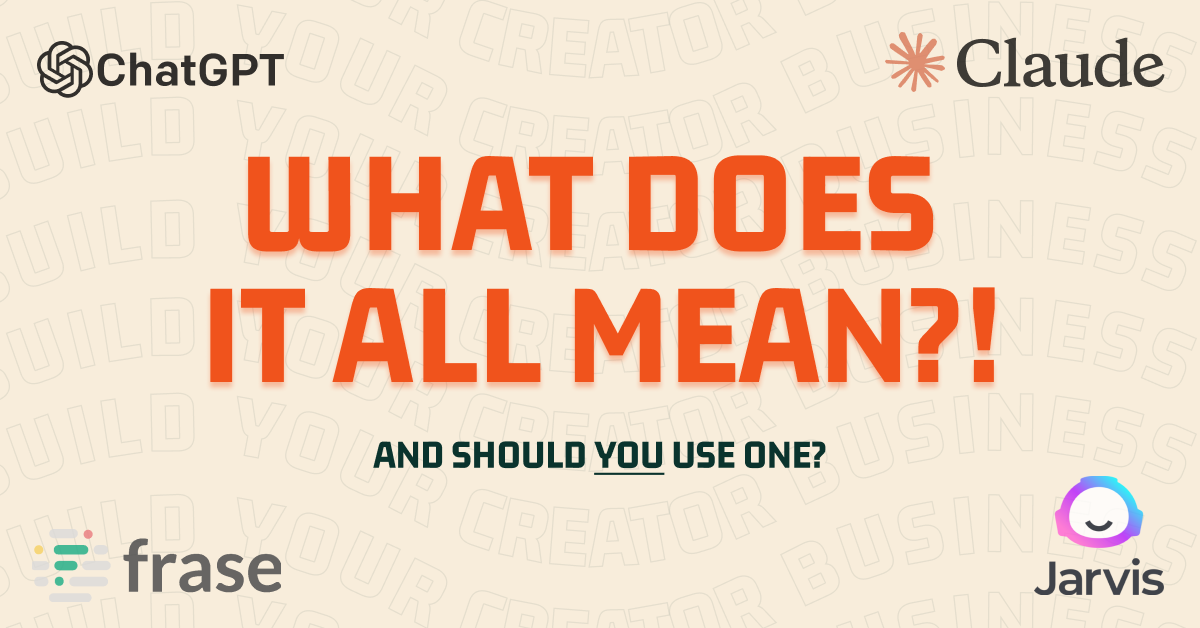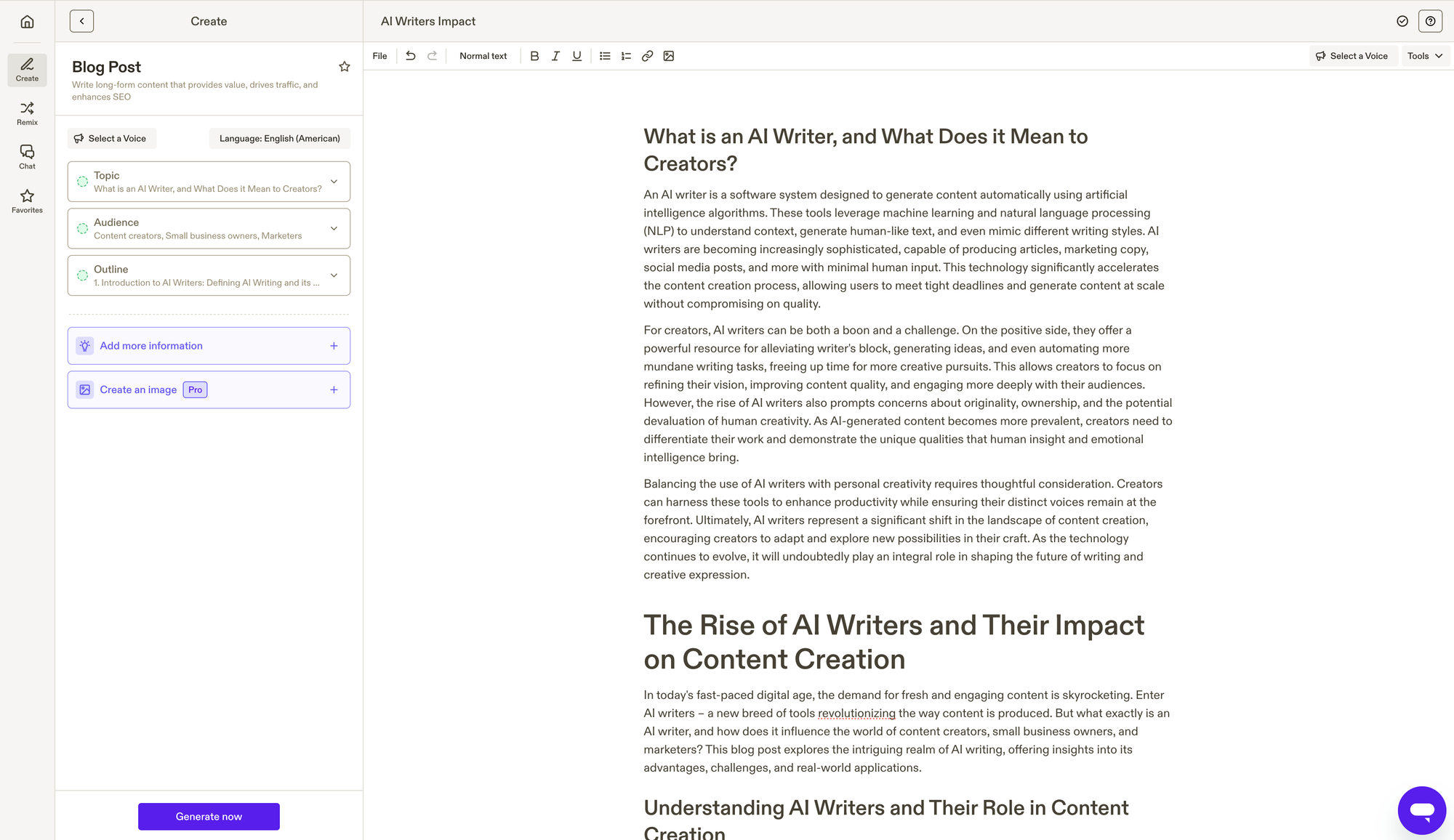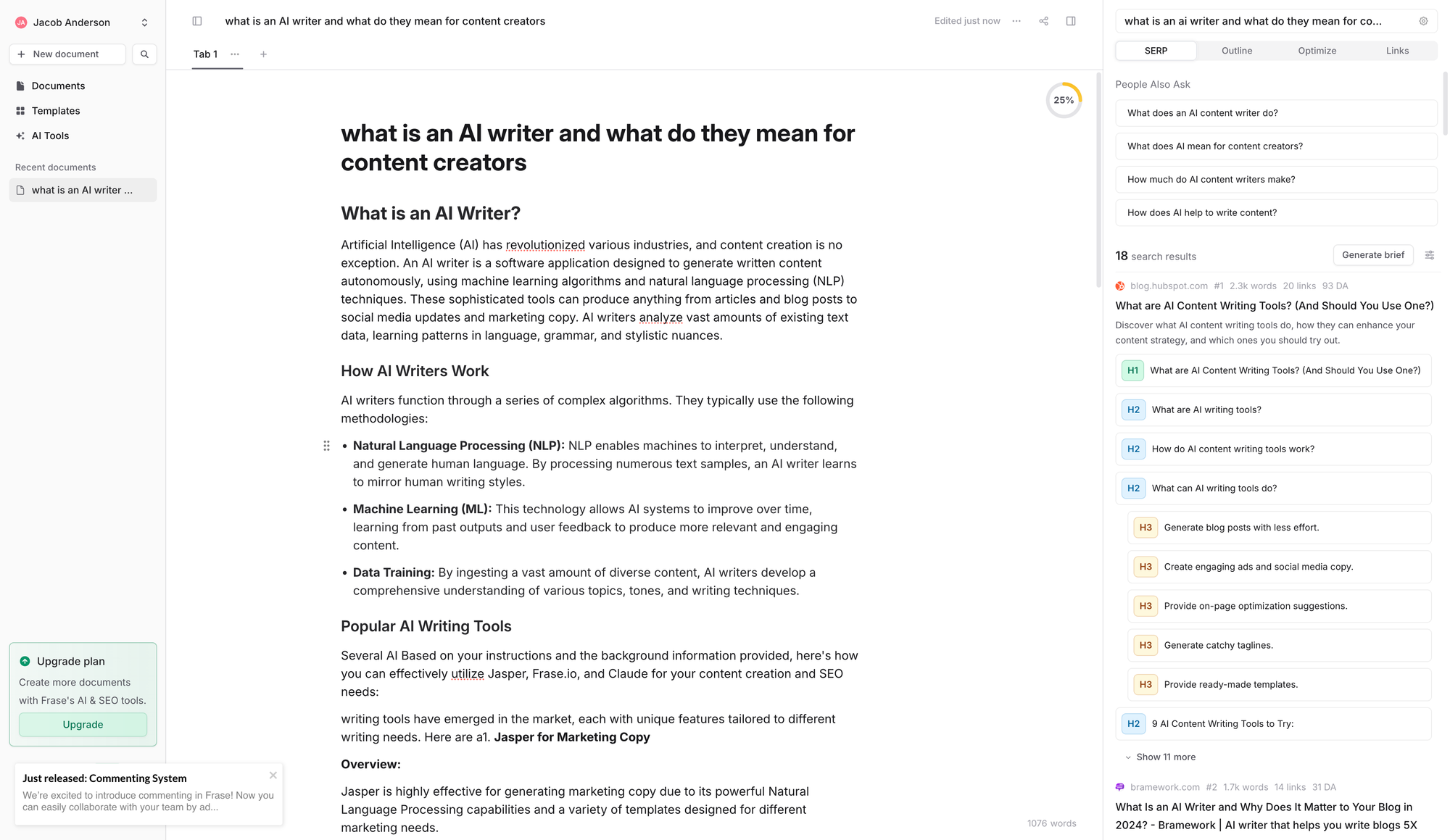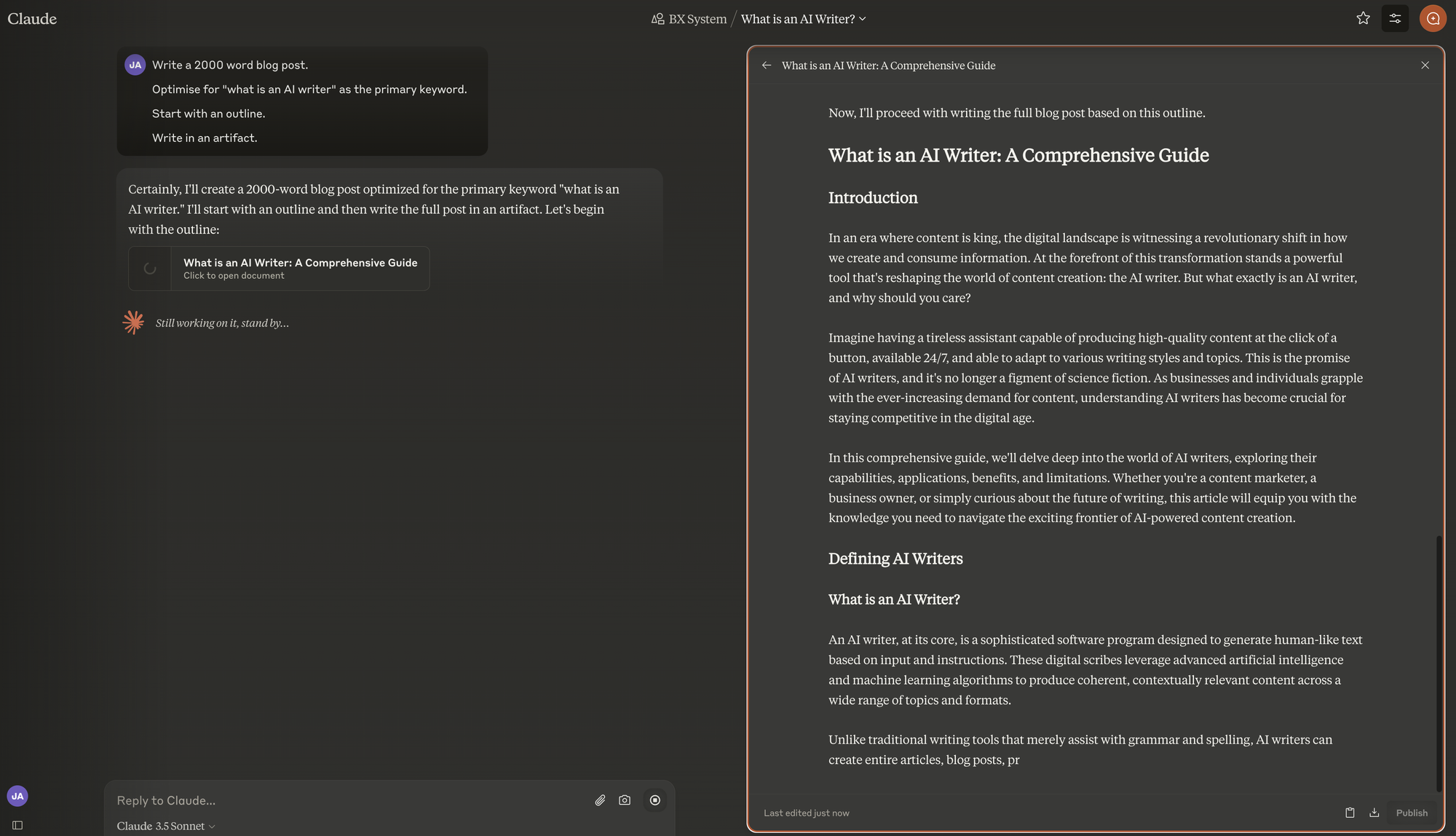What is an AI Writer? What Do They Mean for Content Creators?
In layman's terms, an AI writer is a software program that uses computing power to generate written content. Immense amounts of money are spent 'training' on massive datasets of text, learning language patterns and context to produce human-like writing, based on the prompts we give them.

I know, your head is already spinning. AI writers and chatbots came out of nowhere, and now it feels impossible to get away from. If you're reading this, then you've heard of ChatGPT, which is the 'Hoover' to 'vacuum cleaner' of AI writing tools, but the truth is that there are now countless writing tools and many AI models powering them. So where do you start? How do they work? Are they actually useful for creating content that isn't rubbish?
Let me get the last question of of the way: these tools can be useful, but they're not going to replace you. But, they'll augment your ability to do your best work if you learn to use them right. As a starting point, let me show you how I'm using these tools, and how they could improve your workflow. But first, what is an AI writer?
In layman's terms, an AI writer is a software program that uses computing power to generate written content. Immense amounts of money are spent 'training' on massive datasets of text, learning language patterns and context to produce human-like writing, based on the prompts we give them.
But here's the thing - they're not sentient beings with thoughts and feelings. They're really just incredibly advanced autocomplete systems, predicting the most likely next word based on statistical probabilities. The real magic (or lack thereof) happens in how we instruct them.
I've spent countless hours tinkering with these AI tools, and I've come to a simple yet powerful realisation: the better your input, the better your output. If you ask a generic question like "What is an AI writer?" you'll get a generic answer—the kind thousands of others are receiving. Not exactly inspiring or original, right?
So, let's dive deeper. I want to share what I've learned about AI writers and explore what they mean for content creators like us. We'll look at tools off-the-shelf tools like Jasper.ai and Frase, rolling your own with Claude, and discuss their impact on blogs, podcasts, and YouTube channels. And yes, we'll tackle the big question on everyone's mind: Is this the end of creativity and quality writing?
AI Writing Tools: A Quick Overview
Jasper.ai

Jasper.ai was my first foray into the world of AI writing tools, long before the 2023 ChatGPT mania began. When I first tried it, it felt like pure magic. I remember being convinced there had to be some hidden human input behind the scenes.
Spoiler alert: there wasn't!
Jasper is primarily aimed at marketers, bloggers, and content creators who need to produce copy quickly. They offer a wide range of templates for various content types:
- Blog posts
- Social media updates
- Ad copy
- Email newsletters
- Product descriptions
Pros:
- User-friendly interface that's easy to navigate
- Great for overcoming writer's block
- Templates provide solid starting points for various content types
- Helps generate ideas quickly
Cons:
- It's not cheap, especially if you want access to all features
- Output can often feel generic, requiring significant editing to sound human
- I wasn't impressed with the writing voice features
I found Jasper particularly useful for generating initial ideas and rough drafts. For example, when I was stuck on how to start a blog post about podcast monetization, I used Jasper's blog post intro template. It gave me a solid starting point that I could then mold and shape with my own voice and experiences.
However, I always felt the need to heavily edit Jasper's output. While it's great at following content structures and hitting key points, it lacks the personal touch that makes content truly engaging.
Frase

Now, let's talk about Frase, an AI-powered content optimization tool that focuses on helping you research, write, and optimize your content for search engines. It's a bit different from Jasper and Claude, as its primary focus is on SEO and content strategy.
Pros:
- Built-in content research and SEO features
- Provides valuable insights into competitor content and audience questions
- Guide rails for wide topic coverage
- Combines content creation and SEO strategy into one task
Cons:
- The writing feels... not great. But nothing a human redraft couldn't fix.
- There's a learning curve to fully utilize all its features
- Can sometimes lead to over-optimization if you're not careful
I've found Frase particularly helpful in the research and planning phases of content creation. For instance, when I was working on a series about podcast monetization strategies, Frase helped me understand what questions my audience was asking and what subtopics I needed to cover to create comprehensive content.
One of the standout features of Frase is its ability to analyze top-ranking content for your target keywords. This gives you a clear picture of what's working in your niche. For example, when I was writing about podcast hosting platforms, Frase showed me that successful articles in this space often included pricing comparisons and user interface screenshots - insights I might have overlooked otherwise.
However, while Frase's AI writing features are useful for generating outlines and initial drafts, I find them less adaptable to my personal style compared to Claude. I often use Frase to ensure I'm covering all the necessary points and optimizing for SEO, then switch to Claude or my own writing to add that personal touch.
Claude by Anthropic

Now, let me introduce you to my current favorite: Claude by Anthropic. Unlike Jasper, Claude is a more versatile AI language model capable of handling a variety of tasks. The key difference? You essentially "create" the AI writer yourself.
I've spent countless hours feeding Claude samples of my writing, detailed instructions, and even snippets of my podcast transcripts. It's been a journey, but over time, Claude started producing outputs that resonated more with my style. In fact, parts of this very article were outlined with Claude's help!
Pros:
- Highly customizable, capable of adapting to your unique voice and style
- Versatile enough to help with various content creation tasks beyond just writing
- Improves over time as you provide more context and feedback
- Can handle complex, nuanced instructions
Cons:
- Requires significant upfront effort to "train" it to your style
- Not a set-it-and-forget-it solution; requires ongoing refinement
- Can be overwhelming for users not comfortable with providing detailed prompts
Using Claude feels more like having a writing partner than using a tool. For instance, when I was working on a series of articles about podcasting equipment, I fed Claude information about my experiences with different microphones and my overall philosophy on gear. The resulting outlines not only hit all the technical points but also captured my "buy only what you need" approach.
What I love most about Claude is its ability to adapt. The more I use it, the better it gets at mimicking my style, understanding my preferences, and even anticipating the kind of examples or anecdotes I might use.
If you're interested in creating your own personalized AI writing assistant using Claude, I've written a detailed guide on how to roll your own AI writer with Claude.

It walks you through the process I used to customize Claude to my writing style and content needs.
Is This the End of Creativity and Quality Writing?
Short answer: No. But we're in for a strange ride as the landscape shifts.
Here's my take: Creativity isn't going anywhere. AI can't replicate human experiences, emotions, or the unique perspectives that each of us brings to the table. Sure, it can string sentences together, but it can't tell your story.
We're in a transitional period. Think of it like the advent of digital photography. When everyone got access to high-quality cameras on their phones, some thought professional photography was dead. But what happened? The true artists adapted, and their creativity stood out even more.
That said, we can't ignore the current state of affairs. Twitter is teeming with bots, and sometimes Googling feels like wading through a sea of sameness. It's disheartening, and it raises valid questions about the future of authentic content.
But I believe this is precisely why human creativity is more valuable than ever. In a world flooded with AI-generated noise, our unique voices and perspectives become our superpowers.
What AI Writers Mean for Different Content Creators
For Bloggers and SEO
AI writers can be a game-changer for bloggers, helping with:
- Generating initial drafts
- Brainstorming topics
- Suggesting post structures
- Optimizing for SEO
But here's the catch: while AI can provide a skeleton, it's up to us to breathe life into it. I once used AI to draft a post about productivity hacks. The structure was there, but it lacked personality. By adding my own anecdotes—like that time I tried the Pomodoro Technique and ended up napping instead—I turned a generic post into something uniquely mine.
For SEO, tools like Frase can be helpful, but be cautious of over-optimization. I learned this the hard way when an over-optimized post tanked in engagement. It ranked well initially but didn't resonate with readers, leading to a high bounce rate. Remember, we're writing for humans first, search engines second.
For Podcasters
As a podcaster, I've found AI writers useful for:
- Drafting episode outlines
- Generating show notes
- Creating episode summaries
- Transcribing episodes (though always review for accuracy!)
I've used AI to generate episode outlines based on topics I wanted to cover. It helped me organize my thoughts and ensured I hit key points. But the real connection with my audience comes from the spontaneous stories and insights that happen during recording.
For YouTubers
For video creators, AI writers can assist with:
- Script drafting
- Generating video descriptions
- Optimizing titles and tags
- Creating closed captions
I often use AI to draft a basic script, which I then tweak to match my on-camera style. It's also helpful for generating SEO-friendly descriptions and tags, but I always make sure they accurately reflect the content.
Remember, authenticity is key on YouTube. Viewers can sense when something feels off. I once followed AI's suggestion to include trending but unrelated tags. The result? A slight uptick in views but a significant drop in engagement. Lesson learned: build for your audience, not just for algorithms.
Navigating This Strange New World
So, how do we adapt without losing ourselves? Here are my tips:
- Think of AI as a team member, not a threat.
- Let AI handle repetitive tasks so you can focus on what you do best.
- Use it for idea generation and to explore angles you hadn't considered.
- Maintain your unique voice.
- Always infuse your content with personal stories, humor, and insights.
- Foster real connections with your audience—they'll appreciate your authenticity.
- Consider the ethical implications.
- Be transparent about your use of AI if it feels right for you and your audience.
- Always fact-check. AI can and does make mistakes.
- Ensure your content remains original to avoid plagiarism issues.
- Start small and experiment.
- Try using AI for minor tasks like drafting social media posts or brainstorming topics.
- Gradually integrate it into your workflow as you become more comfortable.
- Keep learning and adapting.
- Stay informed about AI advancements in content creation.
- Be willing to adjust your strategies as the technology evolves.
What Does it all Mean?!
We're venturing into uncharted territory, and that's both exciting and a bit intimidating. AI writers are powerful tools, but they're just that—tools. They can't replace the human touch, the unique experiences, and the creativity that only you can bring to your content.
Embrace the change, but stay true to yourself. Use AI to enhance your work, not define it. Your authenticity is your greatest asset, and in a world increasingly saturated with generic content, it will make you stand out.
Remember, the goal isn't to beat the machines but to work alongside them, enhancing what we already do best. Your voice matters now more than ever.
Stay creative, stay authentic, and let's embrace this weird, wild future together.


